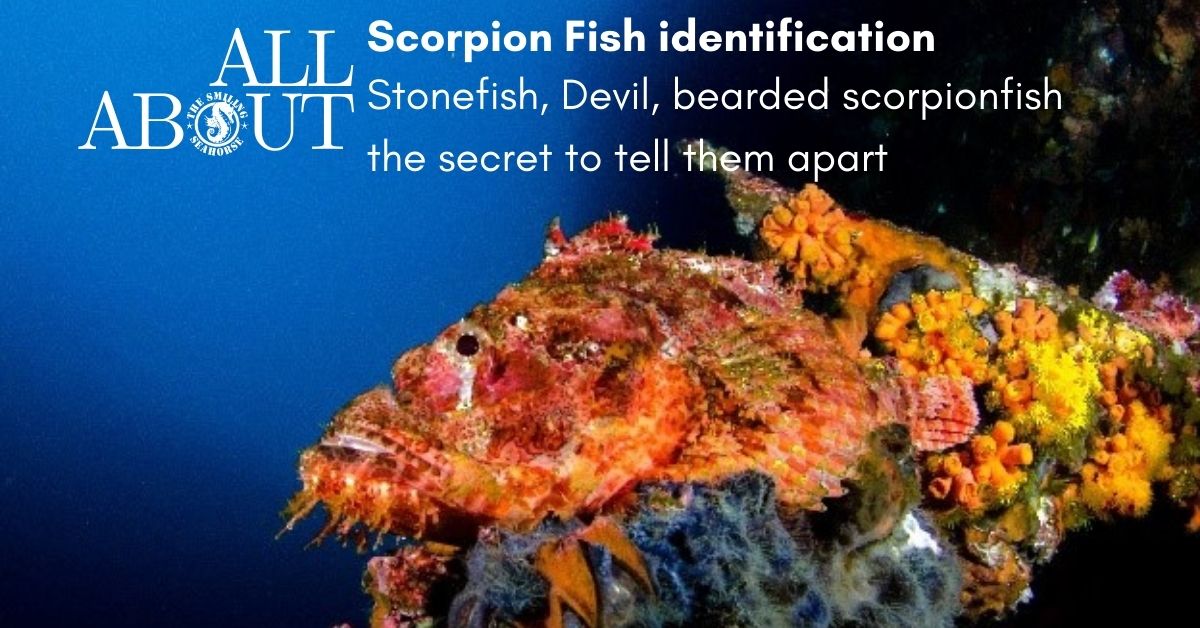
Published
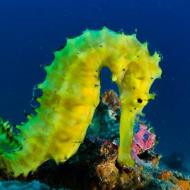 written by camille ROVILLAIN
written by camille ROVILLAIN
This article is going to teach you how to differentiate the 3 most common species of Scorpionfish we encounter in the Andaman sea: Bearded Scorpionfish, Devil Scorpionfish and Stonefish.
These three species are often mistaken because they are quite similar (indeed they belong to the same family), but below are some simple tips to tell them appart during your next dive trip.
Let’s start with their similarities:
- these members of the Scorpaenidae family live on to the ocean floor, often hiding among the coral reef and swim about as well as a chicken can fly...
- They have large heads with strong bony cheek and a surprisingly wide mouth which can capture large preys.
- They are not aggressive but their back spines are highly poisonous. They are not agressive but under attack, they expand their spines to protect themselves and quickly escape to a nearby hideout.
- They are all sedentary prey-stalkers using the same passive strategy as a gecko. You will rarely see them moving something other than their eyes except when they are swallowing whole a prey that passed a bit too close...
These three species are often mistaken because they are quite similar (indeed they belong to the same family), but below are some simple tips to tell them appart during your next dive trip.
Let’s start with their similarities:
- these members of the Scorpaenidae family live on to the ocean floor, often hiding among the coral reef and swim about as well as a chicken can fly...
- They have large heads with strong bony cheek and a surprisingly wide mouth which can capture large preys.
- They are not aggressive but their back spines are highly poisonous. They are not agressive but under attack, they expand their spines to protect themselves and quickly escape to a nearby hideout.
- They are all sedentary prey-stalkers using the same passive strategy as a gecko. You will rarely see them moving something other than their eyes except when they are swallowing whole a prey that passed a bit too close...
Now let's have a look at their differences:
|
The most common Scorpionfish in the Andaman sea is the Tassled Scorpionfish (Scorpaenopsis oxycephala).
Also called bearded scopionfish because of the fleshy outgrowths under their chin, their color usually matches its surrounding quite well and they will sit on rocks of brown or reddish brown color. Its body can reach a length of 36 cm and has a long recognisable fish shape. |
|
A little rarer and a little more stone looking: the Devil Scorpionfish. (Scorpaenopsis diabolus)
Also called false Stonefish because of its resembling appearance of a stone, you can differentiate it from other scorpionfish by the presence of a bump on the back of its head. Its skin looks as rough as sand paper. The inner sides of their pectoral fins have orange, black, and white blotches can be "flashed" as a warning to inquisitive predators. |
Stonefish count themselves among the Synanceja subfamily and are usually quite large, measuring between 30 and 40 cm.
Round shaped, they look like a stone covered in sand, with a leathery looking skin that can be brown/grey, yellow, white, pink or even purple.
Their skin is usually covered in sponge or algae like their surrounding which make them close to invisible...
Scorpionfish’s eyes protrude a little from their head, whereas Stonefish’s are quite difficult to distinguish, recessed, combined with a down-turned grumpy mouth.
Stonefish's spines are thicker, and its back fins are bigger than Scorpionfish’s (but also usually well hidden along their body). Another physical detail can be that its tail is more curled at the end, whereas the Scorpionfish’s is straight.
Stonefish is the world’s most venomous fish in the world, and one more good reason to always be careful where you put your hands while diving. Never touch anything is the safest rule!
Round shaped, they look like a stone covered in sand, with a leathery looking skin that can be brown/grey, yellow, white, pink or even purple.
Their skin is usually covered in sponge or algae like their surrounding which make them close to invisible...
Scorpionfish’s eyes protrude a little from their head, whereas Stonefish’s are quite difficult to distinguish, recessed, combined with a down-turned grumpy mouth.
Stonefish's spines are thicker, and its back fins are bigger than Scorpionfish’s (but also usually well hidden along their body). Another physical detail can be that its tail is more curled at the end, whereas the Scorpionfish’s is straight.
Stonefish is the world’s most venomous fish in the world, and one more good reason to always be careful where you put your hands while diving. Never touch anything is the safest rule!
Infografics: scorpionfishes identification
A little infographic to help you differentiate visually the 3 species
That’s it for today, let’s hope that you learned how to differentiate these 3 species and that you will observe them in our company on The Smiling Seahorse’s boat!
Marine life in the Andaman Sea is very rich, check out this page if you want to learn some more about the fantastic marine life we see in Thailand.
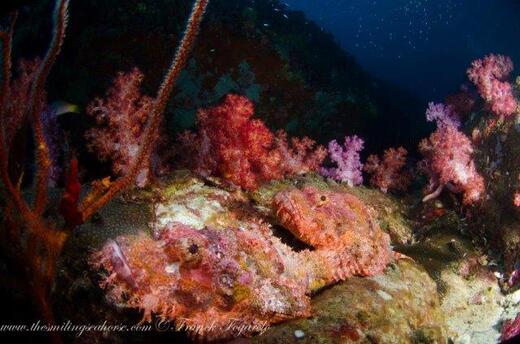
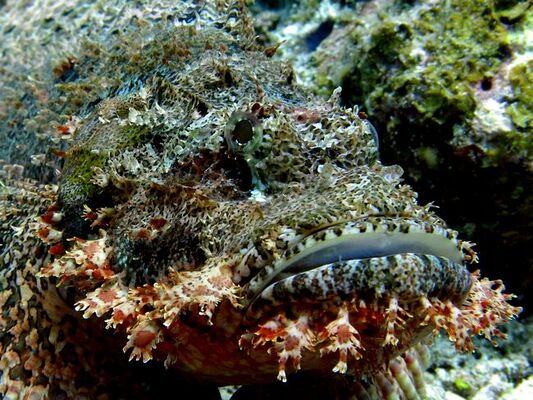
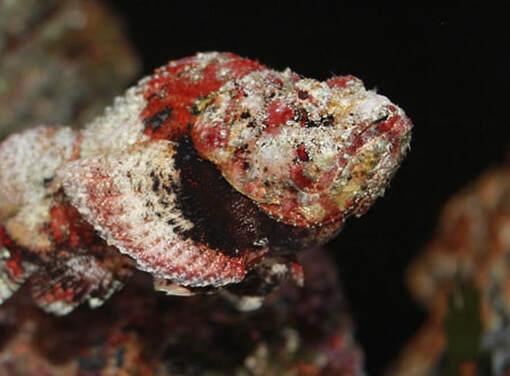
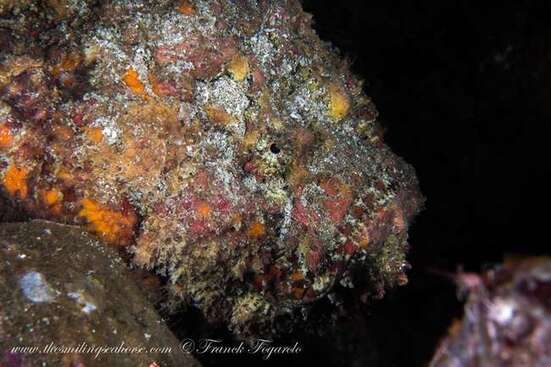
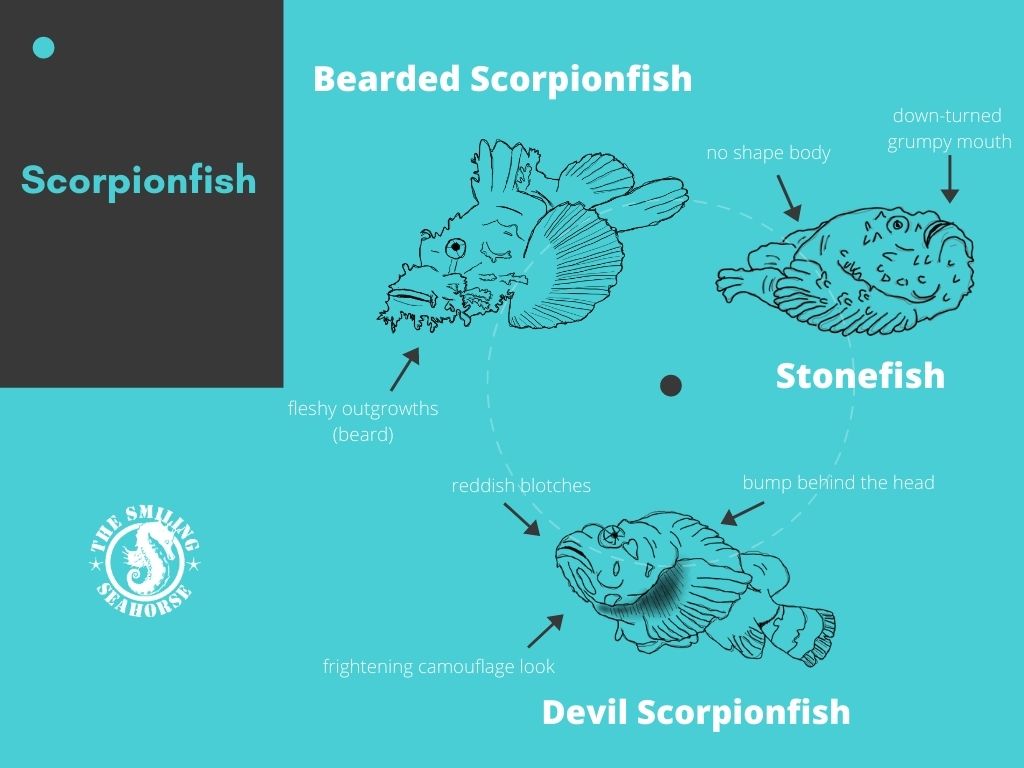

Load more comments